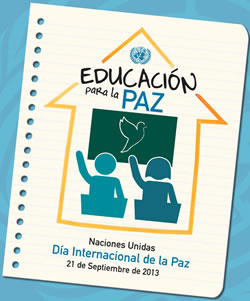International Day of Peace
"This year we are highlighting Education for Peace. Education is vital for fostering global citizenship and building peaceful societies", says the UN Secretary-General, Ban Ki-moon.

The International Day of Peace is a time for reflection - a day when we reiterate our belief in non-violence and call for a global ceasefire. We ask people everywhere to observe a minute of silence, at noon local time, to honour those killed in conflict and the survivors who live with daily trauma and pain.
This year we are highlighting Education for Peace. Education is vital for fostering global citizenship and building peaceful societies.
In June, Malala Yousafzai, the Pakistani schoolgirl targeted for assassination by the Taliban for campaigning for the right to education, came to the United Nations. Malala said: "One teacher, one book, one pen, can change the world." These are our most powerful weapons.
That is why, last year, I launched the Global Education First Initiative. Every girl and every boy deserves to receive a quality education and learn the values that will help them to see themselves as part of a global community.
Governments and development partners are working to get every child in school and learning well to equip them for life in the 21st century. There is new momentum in countries with the greatest needs, such as those affected by conflict, which are home to half of all children lacking education. But we must do more - much more. Fifty-seven million children are still denied an education. Millions more need better schooling.
Educating the poorest and most marginalized children will require bold political leadership and increased financial commitment. Yet aid for education has dropped for the first time in a decade. We must reverse this decline, forge new partnerships, and bring much greater attention to the quality of education.
On this International Day of Peace, let us pledge to teach our children the value of tolerance and mutual respect. Let us invest in the schools and teachers that will build a fair and inclusive world that embraces diversity. Let us fight for peace and defend it with all our might.
Ban Ki-moon
Secretary-General
United Nations